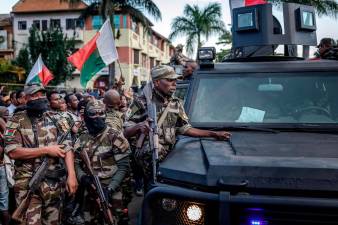ANTANANARIVO: Madagascar soldiers joined thousands of anti-government demonstrators in the capital on Saturday amid escalating political tensions.
A military contingent called on security forces to refuse orders to shoot protesters during the youth-led demonstrations that have rocked the Indian Ocean island for over two weeks.
Prime Minister Ruphin Fortunat Dimbisoa Zafisambo stated the government remained standing strong and ready to collaborate with all forces including youth, trade unions, and the military.
The presidency issued a separate statement confirming President Andry Rajoelina remains in the country and continues to manage national affairs.
Saturday’s demonstration in Antananarivo represented one of the largest protests since the movement began on September 25 over power and water shortages.
Police deployed stun grenades and tear gas against crowds numbering several thousand people before soldiers from the CAPSAT contingent arrived on army vehicles.
Protesters cheered the arriving soldiers with shouts of gratitude while some waved Madagascar flags in celebration.
The security forces’ withdrawal allowed demonstrators to reach the symbolic Place du 13 Mai in front of Antananarivo’s city hall.
CAPSAT Colonel Michael Randrianirina reported that police shot at soldiers passing barracks, resulting in one soldier’s death and a journalist being wounded.
The colonel demanded the resignation of the president, prime minister, and head of gendarmerie during his statement to journalists.
Local media cited emergency services reporting two fatalities and twenty-six injuries from Saturday’s clashes.
Gunfire and explosions continued into the evening as protesters maintained their celebration on the central square.
Soldiers had earlier urged military and security units to refuse payment for shooting fellow citizens in a social media video.
The Soanierana military base previously led a 2009 mutiny that brought President Rajoelina to power during another popular uprising.
The Gen Z movement leading the protests issued written demands including the president’s resignation and initiation of democratic national dialogue.
Protest organizers explicitly stated they seek neither a coup d’état nor seizure of power by force.
One 24-year-old protester described using stones for protection against tear gas while expressing pride in the military’s support.
Another young man anonymously described life in Madagascar as hell due to frequent power and water cuts.
The United Nations documented at least twenty-two protest-related deaths during the movement’s initial days in late September.
President Rajoelina disputed this toll by claiming twelve confirmed deaths involved looters and vandals.
Madagascar has experienced frequent popular uprisings since gaining independence from France in 1960.
President Rajoelina appointed an army general as prime minister after firing his government on September 30, but this failed to quell the ongoing protests. – AFP
